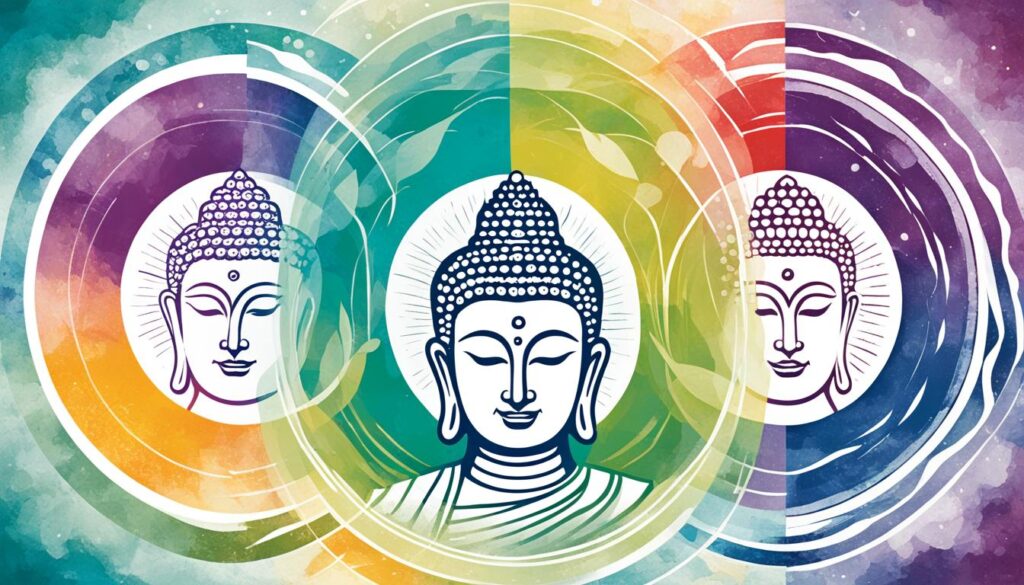“Thousands of candles can be lighted from a single candle, and the life of the candle will not be shortened. Happiness never decreases by being shared.” – Buddha
Buddhism, a major global religion rooted in the teachings of Siddhartha Gautama, offers profound insights into the nature of existence and the pursuit of liberation from suffering. With a rich history and a diverse set of beliefs, Buddhism serves as a guiding light for individuals on their spiritual journey.
The core beliefs of Buddhism are encapsulated in the Four Noble Truths, which provide a framework for understanding suffering and the path to liberation. Buddhism also emphasizes the concepts of karma and the cycle of rebirth, offering individuals a perspective on personal responsibility and the opportunity for growth and transformation.
Meditation, a central practice in Buddhism, is a powerful tool for cultivating mindfulness and attaining enlightenment. By embracing the balance between essence and phenomenon, individuals can find inner peace and live a meaningful life. The Noble Eightfold Path guides practitioners in ethical conduct, mental discipline, and wisdom, empowering them to live in harmony with themselves and others.
Join us as we delve into the major beliefs of Buddhism, unlocking the essence of this ancient wisdom and discovering how it can enrich our lives and contribute to a more compassionate world.
Key Takeaways:
- The Four Noble Truths provide a framework for understanding suffering and the path to liberation.
- Karma emphasizes personal responsibility and the power of individual actions.
- Meditation is a powerful practice for cultivating mindfulness and attaining enlightenment.
- The balance between essence and phenomenon offers insights into the nature of reality.
- The Noble Eightfold Path provides guidance for living a meaningful and ethical life.
The Four Noble Truths: Understanding the Nature of Suffering
The Four Noble Truths are the cornerstone of Buddhist teachings, offering profound insights into the nature of suffering and the path to liberation. They provide a framework for understanding the root causes of suffering and offer a roadmap towards attaining freedom from it.
The First Noble Truth: Suffering Exists
The First Noble Truth acknowledges the reality of suffering as an inherent part of human existence. Whether it is physical, emotional, or psychological, suffering is a universal experience that impacts everyone. It encompasses not only the obvious forms of pain but also subtle forms of dissatisfaction and discontentment.
The Second Noble Truth: The Root Causes of Suffering
The Second Noble Truth reveals that desire and ignorance lie at the heart of human suffering. The constant craving for pleasure, possessions, and outcomes that align with our preferences leads to attachment and disappointment. Ignorance, the misunderstanding of the impermanent and interconnected nature of reality, further fuels our desires, perpetuating the cycle of suffering.
The Third Noble Truth: Ending Suffering
The Third Noble Truth offers hope by proclaiming that suffering can be ended. It teaches that liberation from suffering is possible through the attainment of Nirvana, a state of ultimate awakening and freedom. Nirvana transcends the limitations of the ego and the cycle of birth and rebirth, allowing individuals to experience profound peace and liberation.
The Fourth Noble Truth: The Noble Eightfold Path
The Fourth Noble Truth outlines the Noble Eightfold Path as a transformative guide towards liberation from suffering. The Noble Eightfold Path consists of eight interconnected practices that encompass ethical conduct, mental discipline, and wisdom. By cultivating these qualities, individuals can transcend suffering and attain enlightenment.
Take a moment to reflect on the Four Noble Truths, contemplating the nature of suffering in your own life. Consider how desire and ignorance contribute to your own experiences of suffering. By acknowledging these truths, you can embark on a journey of self-discovery, paving the way for liberation and inner peace.

Understanding Karma and the Cycle of Rebirth
Within Buddhism, there are key beliefs that shape its core tenets and principles. One of these fundamental concepts is karma, which plays a significant role in understanding the nature of cause and effect in our lives.

Karma, in simple terms, refers to the idea that our actions have consequences. It is the understanding that every thought, word, and deed contributes to the shaping of our future experiences. By recognizing the power of our choices, we become aware of our personal responsibility in creating our own destiny.
Good actions lead to positive outcomes and happiness, while bad actions result in negative outcomes and suffering. This understanding allows individuals to reflect on their behaviors and strive to cultivate positive intentions and actions in order to create a more harmonious and fulfilling life.
It is important to note that karma is not seen as predestined fate within Buddhism. Instead, it is viewed as a dynamic force that can be influenced and altered through conscious effort. This empowers individuals with the belief that they have control over the direction of their lives and the opportunity to make positive changes.
Linked to the concept of karma is the cycle of rebirth, also known as samsara. According to Buddhist beliefs, when a person dies, they are reborn into a new form based on their karma. This cycle continues until one achieves enlightenment and breaks free from the cycle of birth and rebirth.
Table: The Six Realms of Existence
| Realms | Description |
|---|---|
| Gods | Beings experiencing great pleasure, but still subject to impermanence. |
| Humans | The realm that offers an opportunity to strive towards enlightenment and liberation. |
| Animals | Beings driven by instinct and bound by the cycle of birth and death. |
| Ghosts | Beings trapped in a state of constant dissatisfaction, craving, and torment. |
| Hell Beings | Beings subjected to intense suffering and pain. |
| Demigods | Beings consumed by power, pride, and jealousy. |
The realm of human life is considered a precious opportunity as it offers individuals the ability to work towards achieving enlightenment and liberation from the cycle of rebirth. It is through understanding karma and the cycle of rebirth that individuals gain insight into the interconnectedness of their actions and their impact on their journey towards spiritual awakening.
Section 3 Key Takeaways:
- Karma is the belief that every action has consequences.
- Good actions lead to positive outcomes, while bad actions result in suffering.
- Individuals have the power to shape their own destiny through their choices and actions.
- The cycle of rebirth is closely tied to karma and offers the opportunity for spiritual development.
- Understanding the interconnectedness of karma and rebirth brings awareness to the importance of personal responsibility.
Finding the Path to Enlightenment through Meditation
If you want to unlock the essence of Buddhism and deepen your understanding of its core beliefs, meditation is an essential practice to embrace. Through meditation, you can cultivate mindfulness and embark on a transformative journey towards enlightenment.
Meditation plays a significant role in Buddhism, allowing practitioners to focus their minds and gain insight into the true nature of reality.
Meditation is a practice of self-reflection and self-awareness. It provides a space for you to observe your thoughts, emotions, and sensations without attachment or judgment. By cultivating this non-attached awareness, you can break free from the cycle of desire and ignorance that leads to suffering.
Buddhist meditation techniques can vary, but they often involve focusing your attention on the breath, cultivating loving-kindness towards yourself and others, and developing mindfulness in your daily activities. Regular meditation practice helps you develop clarity, compassion, and wisdom—the essential qualities for attaining enlightenment.

The Benefits of Meditation in Buddhism
Meditation in Buddhism offers numerous benefits for individuals seeking a deeper understanding of their own minds, emotions, and the world around them. It provides:
- Clarity of mind and focus
- Enhanced self-awareness and insight
- Reduced stress and anxiety
- Increased compassion and empathy
- Improved concentration and mental discipline
- Heightened sense of well-being and inner peace
As you dive deeper into the practice of meditation, you will discover that it is not merely a relaxation technique but a powerful tool for personal growth and spiritual development. It opens doors to profound wisdom and enables you to experience the interconnectedness of all beings.
A Simple Meditation Practice
If you’re new to meditation, here’s a simple practice you can follow:
- Find a quiet and comfortable place where you won’t be easily disturbed.
- Sit in a relaxed yet alert posture, with your back straight and your palms resting on your thighs.
- Close your eyes and bring your attention to your breath. Notice the sensation of the breath as it enters and leaves your body.
- Whenever your mind wanders, gently bring your attention back to the breath without judgment.
- Continue this practice for a few minutes to start, gradually increasing the duration as you feel more comfortable.
Remember to approach meditation with patience and kindness towards yourself. It is a practice that can be cultivated over time, and the benefits will unfold naturally as you commit to regular practice.
| Meditation Techniques | Description |
|---|---|
| Focused Attention Meditation | Focuses on a single object of attention, such as the breath or a mantra. |
| Loving-Kindness Meditation | Cultivates feelings of love, compassion, and goodwill towards oneself and others. |
| Mindfulness Meditation | Involves maintaining non-judgmental awareness of the present moment. |
| Walking Meditation | Combines mindful awareness with walking, bringing attention to each step. |
By exploring different meditation techniques, you can find the one that resonates with you and supports your spiritual journey. Remember, the path to enlightenment is unique for each individual, and meditation is a powerful tool that can guide you towards deeper wisdom and inner transformation.
Embracing the Balance of Essence and Phenomenon
Buddhism offers a unique perspective on the nature of existence by emphasizing the balance between essence and phenomenon. Essence refers to perceiving the world through the lens of the universe, recognizing its vastness, emptiness, and impermanence. It is a way of seeing reality as it truly is, free from attachment and delusion.
Phenomenon, on the other hand, encompasses the daily realities and emotions that individuals experience, such as suffering, happiness, and uncertainty. Buddhism teaches that by understanding the impermanence and transitory nature of phenomenon, individuals can avoid being swept away by fleeting emotions and achieve a state of inner peace.
This balance between essence and phenomenon is achieved through practices such as meditation, self-reflection, and mindfulness, which help individuals cultivate wisdom, compassion, and acceptance of the present moment. By engaging in these practices, you can develop a deeper understanding of the interconnectedness of all things and find harmony within yourself and in your relationship with the world around you.
The Interconnection of Essence and Phenomenon
- Recognizing the vastness and interconnectedness of the universe
- Embracing the impermanence of all things
- Cultivating a sense of detachment and non-attachment
- Finding peace and contentment in the present moment
The Practice of Meditation and Mindfulness
- Developing presence and awareness through meditation
- Cultivating a deeper understanding of the self and the world
- Letting go of attachments and desires
- Finding inner peace and tranquility
The Role of Self-Reflection and Wisdom
- Reflecting on the nature of existence and the impermanence of phenomena
- Seeking wisdom and insight into the true nature of reality
- Cultivating compassion and empathy for all living beings
- Applying wisdom to navigate the challenges of life
| The Balance of Essence and Phenomenon | Meditation and Mindfulness | Self-Reflection and Wisdom |
|---|---|---|
| Emphasizes interconnectedness and impermanence | Cultivates presence and self-awareness | Promotes understanding and compassion |
| Helps avoid attachment and delusion | Facilitates inner peace and tranquility | Guides decision-making and actions |
Living a Meaningful Life with the Noble Eightfold Path
The Noble Eightfold Path serves as a practical and comprehensive guide for shaping a meaningful and ethical existence in accordance with the principles of Buddhism. This path consists of eight interdependent practices that encompass three essential categories: ethics (sila), meditation (samadhi), and wisdom (panna). By following this path, you can cultivate virtuous qualities, transform your being, and bring harmony to your relationships with others and the world around you.
1. Ethics: Sila
In this category, the focus is on establishing and nurturing good moral conduct that seeks to avoid causing harm to oneself and others. Ethical actions form the foundation for a harmonious and compassionate existence. The practices within this category include:
- Right Understanding: Developing an accurate understanding of the nature of reality and the teachings of Buddhism.
- Right Thought: Cultivating thoughts of goodwill, compassion, and non-harming towards oneself and others.
- Right Speech: Using speech that is truthful, beneficial, and avoids causing harm.
- Right Action: Engaging in actions that are wholesome, compassionate, and in line with the principles of Buddhism.
- Right Livelihood: Engaging in a livelihood that is ethical and promotes well-being without causing harm.
2. Meditation: Samadhi
Meditation is a key practice in Buddhism. Through meditation, you cultivate mental concentration and insight, developing a deeper awareness of the present moment. This category includes practices that enhance mindfulness and concentration, such as:
- Right Effort: Making a committed effort to cultivate positive qualities and eliminate negative ones.
- Right Mindfulness: Cultivating a deep awareness and presence in each moment, observing thoughts, feelings, and sensations without judgment or attachment.
- Right Concentration: Cultivating a focused and concentrated mind through specific meditation techniques and practices.
3. Wisdom: Panna
Wisdom is at the heart of Buddhism, empowering individuals to gain a profound understanding of the true nature of reality and the path to liberation. The practices within this category involve developing wisdom through insight and contemplation. They include:
- Right Understanding: Expanding your understanding of the Four Noble Truths and the interconnectedness of all phenomena.
- Right Thought: Cultivating thoughts that are aligned with the wisdom of Buddhism, focusing on liberation from suffering.
The Noble Eightfold Path provides a comprehensive framework for leading a meaningful life that is deeply rooted in Buddhist beliefs and principles. When integrated into your daily existence, these practices support personal growth, foster compassion, and contribute to the overall harmony of society.

| Category | Practice | Description |
|---|---|---|
| Ethics: Sila | Right Understanding | Developing an accurate understanding of the nature of reality and the teachings of Buddhism. |
| Right Thought | Cultivating thoughts of goodwill, compassion, and non-harming towards oneself and others. | |
| Right Speech | Using speech that is truthful, beneficial, and avoids causing harm. | |
| Right Action | Engaging in actions that are wholesome, compassionate, and align with the principles of Buddhism. | |
| Right Livelihood | Engaging in a livelihood that is ethical and promotes well-being without causing harm. | |
| Meditation: Samadhi | Right Effort | Making a committed effort to cultivate positive qualities and eliminate negative ones. |
| Right Mindfulness | Cultivating a deep awareness and presence in each moment, observing thoughts, feelings, and sensations without judgment or attachment. | |
| Right Concentration | Cultivating a focused and concentrated mind through specific meditation techniques and practices. | |
| Wisdom: Panna | Right Understanding | Expanding your understanding of the Four Noble Truths and the interconnectedness of all phenomena. |
| Right Thought | Cultivating thoughts that are aligned with the wisdom of Buddhism, focusing on liberation from suffering. |
Embracing the Teachings of Buddhism for Personal and Societal Harmony
Buddhism’s fundamental beliefs hold profound wisdom and provide invaluable guidance for individuals seeking personal and societal harmony. At the core of Buddhism teachings are the Four Noble Truths, which invite practitioners to understand and address the root causes of suffering. By embodying mindfulness, compassion, and wisdom, individuals can cultivate qualities that lead to personal growth and the betterment of society.
When embracing the beliefs in Buddhism, the concepts of karma and rebirth hold significant importance. The recognition of one’s actions and their consequences empowers individuals to take responsibility for their choices. By consciously seeking positive outcomes and nurturing virtuous qualities, individuals contribute to creating a harmonious existence for themselves and others.
One of the vital practices in Buddhism is meditation, which enables individuals to develop self-awareness, concentration, and inner peace. Through regular meditation, one gains a deeper understanding of the true nature of reality and cultivates contentment within the present moment. This practice equips individuals to navigate the challenges of life with clarity, resilience, and compassion.
The Noble Eightfold Path, a comprehensive framework encompassing ethics, meditation, and wisdom, guides practitioners in living a purposeful and meaningful life. Upholding principles such as right understanding, speech, action, and livelihood, individuals can foster positive relationships, contribute to their communities, and create a harmonious society. Buddhism beckons individuals to explore their innermost nature, unlock the essence of their being, and actively contribute to a world infused with peace and compassion.
FAQ
What are the major beliefs in Buddhism?
The major beliefs in Buddhism include the Four Noble Truths, which address the truth of suffering, the cause of suffering, the end of suffering, and the path to the end of suffering. Buddhism also emphasizes the concept of karma, where actions determine future experiences, and the cycle of rebirth, where beings are reborn into different realms based on their karma. The ultimate goal in Buddhism is to achieve Nirvana, a state of freedom from suffering and the cycle of birth and rebirth.
What are the Four Noble Truths in Buddhism?
The Four Noble Truths in Buddhism are the truth of suffering, the cause of suffering, the end of suffering, and the path to the end of suffering. They offer a framework for understanding the nature of suffering and how to attain liberation from it.
What is karma in Buddhism?
Karma is a fundamental belief in Buddhism that states that every action, whether positive or negative, has consequences. Good actions lead to positive outcomes and happiness, while bad actions result in negative outcomes and suffering. Karma emphasizes personal responsibility and the idea that individuals have the power to shape their own destiny through their actions.
What is the cycle of rebirth in Buddhism?
The cycle of rebirth, also known as samsara, is a closely related concept to karma in Buddhism. According to this belief, when a person dies, they are reborn into a new form based on their karma. There are six realms of existence, including the realms of gods, humans, animals, ghosts, hell beings, and demigods. The realm of human life is considered a precious opportunity to work towards enlightenment and liberation from the cycle of rebirth.
How does meditation play a role in Buddhism?
Meditation plays a significant role in Buddhism as a means to cultivate mindfulness and achieve enlightenment. It involves focusing the mind and gaining insight into the true nature of reality. By observing thoughts, emotions, and sensations without attachment or judgment, individuals can break free from suffering and the cycle of desire and ignorance.
What is the balance between essence and phenomenon in Buddhism?
Buddhism emphasizes the balance between essence and phenomenon. Essence refers to perceiving the world through the lens of the universe, recognizing its vastness, emptiness, and impermanence. Phenomenon encompasses the daily realities and emotions experienced by individuals. By understanding the impermanence and transitory nature of phenomenon, individuals can avoid being swept away by fleeting emotions and achieve a state of inner peace.
What is the Noble Eightfold Path?
The Noble Eightfold Path is a practical guide for living a meaningful and ethical life according to Buddhist teachings. It consists of eight interconnected practices: Right Understanding, Right Thought, Right Speech, Right Action, Right Livelihood, Right Effort, Right Mindfulness, and Right Concentration. These practices help individuals cultivate virtuous qualities and transform themselves to live in harmony with others and the world around them.
How can Buddhism contribute to personal and societal harmony?
Buddhism offers profound insights and guidance for individuals seeking personal and societal harmony. By addressing the root causes of suffering and cultivating qualities like mindfulness, compassion, and wisdom, individuals can unlock their own potential for enlightenment. Through principles such as karma and the Noble Eightfold Path, Buddhism encourages personal responsibility and ethical living. Embracing the teachings of Buddhism can lead to a more peaceful and compassionate world.

